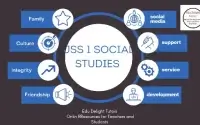Revision of All Topics Covered Christian Religious Studies JSS 1 First Term Lesson Notes Week 11
Christian Religious Studies JSS 1 First Term Lesson Notes Week 11
Revision of All Topics Covered
Part A: Review and Revision
Instructions: Review the answers to these frequently asked questions to better understand the topics covered this term.
- What does “Call to Service” mean?
- It means responding to God’s invitation to serve others or take on responsibilities.
- Who was Joseph in the Bible?
- Joseph was one of the twelve sons of Jacob who was sold into slavery and later became a powerful leader in Egypt.
- What did Moses do after God called him?
- Moses led the Israelites out of Egypt and received the Ten Commandments from God.
- Why is Abraham important in Christian teachings?
- Abraham is known for his faithfulness to God, including his willingness to sacrifice his son Isaac.
- What was Joshua’s role in the Bible?
- Joshua succeeded Moses as the leader of the Israelites and led them into the Promised Land.
- What is a family?
- A family is a group of people related by blood or marriage who live together and support each other.
- What are the different types of families?
- Types include nuclear families (parents and children), extended families (relatives living together), and single-parent families.
- What roles do family members play?
- Members include parents who provide care, children who help with chores, and siblings who support each other.
- How should we choose friends?
- Friends should be supportive, trustworthy, and share similar values and interests.
- What is the role of a Church Administrator?
- A Church Administrator manages church records, schedules, and coordinates events.
- What does “Call to Obedience” involve?
- It involves following God’s commands and instructions with faith and commitment.
- What was the significance of Joseph’s service in Egypt?
- Joseph’s service was important because he used his position to help his family and many others during a time of famine.
- What did God ask Moses to do in Exodus 3?
- God asked Moses to lead the Israelites out of slavery in Egypt.
- What are the roles of a Deacon in church?
- Deacons assist with church services, support the Pastor, and help with community outreach.
- How does a Pastor contribute to church life?
- A Pastor leads worship, preaches sermons, and provides spiritual guidance to the congregation.
- What was the importance of Abraham’s willingness to sacrifice Isaac?
- It demonstrated his trust in God and his commitment to obey God’s will.
- How does the role of a Choir Member support church services?
- Choir Members sing during services to enhance worship and create a spiritual atmosphere.
- Why is the story of Joshua significant?
- Joshua’s story shows leadership and faithfulness as he led the Israelites into the Promised Land.
- What does a Sunday School Teacher do?
- A Sunday School Teacher educates children about the Bible and helps them grow spiritually.
- What are some examples of relationships in the school community?
- Relationships include those between students, teachers, and school staff, all working together to support learning.
Part B: Objective Questions
Instructions: Choose the correct answer for each question and fill in the blanks.
- Joseph was sold into slavery by his ______.
a. Friends
b. Sisters
c. Brothers
d. Parents - The main role of a ______ is to lead worship services in church.
a. Deacon
b. Pastor
c. Administrator
d. Choir Member - ______ was asked by God to lead the Israelites out of Egypt.
a. Joshua
b. Joseph
c. Moses
d. Abraham - The term ______ refers to following God’s commands with faith.
a. Service
b. Leadership
c. Obedience
d. Teaching - ______ helped organize church events and manage records.
a. Pastor
b. Administrator
c. Choir Member
d. Deacon - The story of ______ involves his leadership in the Promised Land.
a. Moses
b. Joseph
c. Abraham
d. Joshua - ______ is known for his willingness to sacrifice his son as a test of faith.
a. Moses
b. Joseph
c. Joshua
d. Abraham - The role of a ______ includes teaching children about the Bible.
a. Pastor
b. Sunday School Teacher
c. Deacon
d. Administrator - ______ was a leader who followed God’s instructions to conquer Jericho.
a. Joseph
b. Abraham
c. Moses
d. Joshua - The role of a ______ involves assisting with church duties and community outreach.
a. Choir Member
b. Administrator
c. Pastor
d. Deacon - In a family, the ______ typically provides care and support for children.
a. Sibling
b. Parent
c. Friend
d. Teacher - The story of ______ shows his rise from slavery to becoming a leader.
a. Moses
b. Joseph
c. Joshua
d. Abraham - The ______ helps maintain church records and schedules.
a. Pastor
b. Deacon
c. Administrator
d. Choir Member - The term ______ includes all the people related to you by blood or marriage.
a. Community
b. Family
c. Friends
d. Neighbors - A ______ in the church sings and leads worship music.
a. Deacon
b. Choir Member
c. Administrator
d. Sunday School Teacher - The story of ______ involves a burning bush and a divine call.
a. Moses
b. Joshua
c. Joseph
d. Abraham - The main role of a ______ is to support the Pastor and help with church duties.
a. Choir Member
b. Administrator
c. Deacon
d. Sunday School Teacher - ______ led the Israelites into the Promised Land after Moses.
a. Abraham
b. Joshua
c. Joseph
d. Moses - The role of a ______ involves teaching Bible lessons to children.
a. Pastor
b. Sunday School Teacher
c. Deacon
d. Choir Member - The term ______ refers to responding to God’s invitation to serve others.
a. Leadership
b. Service
c. Obedience
d. Teaching
Part C: Theory Questions
Instructions: Answer the following questions in short.
- What is the meaning of “Call to Service” in Christian teachings?
- Describe the significance of Joseph’s role in Egypt.
- How did Moses respond to God’s call in Exodus 3?
- What was Joshua’s role after Moses, and why was it important?
- Explain the concept of “Call to Obedience.”
- What are the responsibilities of a Church Administrator?
- How does Abraham’s story demonstrate obedience to God?
- What are the different types of families, and what roles do members play?
- How does the role of a Sunday School Teacher contribute to a church?
- What was the impact of Joseph’s leadership during the famine in Egypt?
- What are the main duties of a Pastor in a church?
- Describe the story of Joshua and his leadership.
- How does the role of a Choir Member support worship services?
- What does the term “family” include in a Christian context?
- How did Moses’ encounter with the burning bush impact his leadership?
- What role does a Deacon play in supporting church activities?
- Explain how choosing friends wisely affects one’s life.
- Describe the responsibilities of a Deacon in a church setting.
- How does a Church Administrator support church operations?
- What lessons can be learned from Abraham’s willingness to sacrifice Isaac?
Part D: True or False Questions
Instructions: Indicate whether each statement is True or False.
- True or False: Joshua succeeded Moses as the leader of the Israelites.
- True or False: Abraham’s obedience involved his willingness to sacrifice Isaac.
- True or False: A Church Administrator is responsible for leading worship services.
- True or False: Joseph’s story teaches about faithfulness and leadership.
- True or False: A Sunday School Teacher focuses on educating adults in the church.
- True or False: The role of a Deacon is to assist with church services and outreach.
- True or False: Moses was called by God through a burning bush.
- True or False: The term “family” includes people who live together and support each other.
- True or False: A Choir Member plays a key role in enhancing worship through music.
- True or False: The Pastor’s role includes managing church administrative tasks.
- True or False: The story of Joshua highlights his journey from slavery to leadership.
- True or False: A Deacon’s role includes managing church records.
- True or False: The story of Joseph involves his rise to leadership in Egypt.
- True or False: The term “Call to Obedience” means following God’s commands with faith.
- True or False: A Sunday School Teacher teaches Bible lessons to children.
- True or False: Abraham’s story is significant for his faithfulness to God.
- True or False: The main role of a Church Administrator is to sing in the choir.
- True or False: Joseph’s service in Egypt helped his family and many others during a famine.
- True or False: The term “Call to Service” refers to responding to God’s invitation to help others.
- True or False: Joshua was the leader who led the Israelites into the Promised Land.
Part E: Fill in the Gaps Questions
Instructions: Fill in the blanks with the appropriate words.
- Joseph was sold into slavery by his ______.
- The ______ led the Israelites out of Egypt and received the Ten Commandments.
- Abraham’s willingness to ______ Isaac demonstrated his trust in God.
- The role of a ______ involves assisting with church services and outreach.
- The story of ______ involves his leadership in conquering Jericho.
- A ______ is responsible for managing church records and schedules.
- The term “______” means following God’s commands with commitment.
- The ______ supports the Pastor by assisting with church duties.
- The story of Joseph shows his rise from ______ to a leader in Egypt.
- The ______ teaches children about the Bible and helps them grow spiritually.
- The main role of a ______ in church is to lead worship services.
- The term “______” refers to responding to God’s invitation to serve others.
- The role of a ______ includes singing and leading worship music.
- The story of ______ shows his faithfulness in leading the Israelites into the Promised Land.
- The concept of family includes people related by ______ or marriage.
- A ______ helps with church operations and coordinates events.
- The story of Moses includes his encounter with a ______ bush.
- A ______ helps organize and manage church activities and records.
- The term “______” refers to the group of people who support and care for each other.
- The role of a ______ in a church is to provide spiritual guidance and leadership.
This revision covers key concepts and roles in Christian Religious Studies, enhancing understanding and preparation for assessments.


